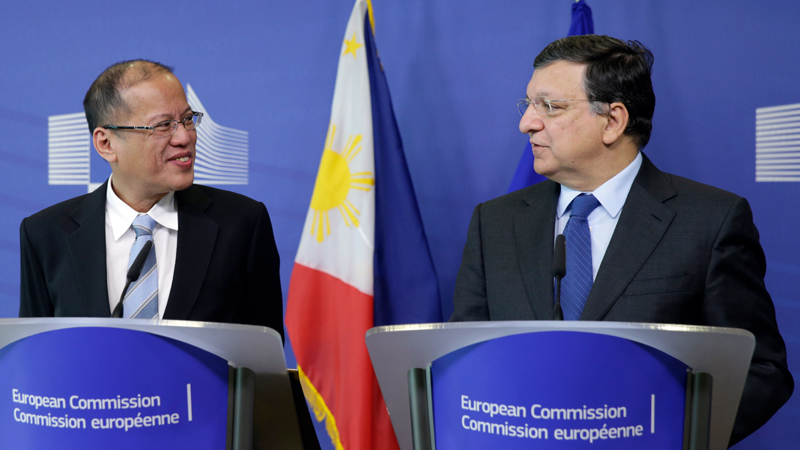
European Commission President Jose Manuel Barroso, right, and Philippine President Benigno Aquino III address the media at the European Commission headquarters in Brussels, Monday, Sept. 15, 2014. They discussed the Mindanao Peace negotiations, trade and investment, bilateral development cooperation and maritime issues. AP PHOTO/YVES LOGGHE
BRUSSELS—The Philippines and the European Union (EU) agree that territorial disputes in the South China Sea should be resolved through international arbitration.
This was made clear when President Aquino sat down on Monday with European Commission President José Manuel Barroso at the EC headquarters in the Berlaymont building here, as both leaders emphasized the need to settle differences between China and its neighbors peacefully.
With both the Philippines and the EU seeking the same route, Aquino said “China will have to listen,” noting that the EU is its “biggest trading partner.”
Beijing, which is claiming around 90 percent of the South China Sea, has rejected international arbitration, insisting that disputes should be resolved bilaterally with individual claimants like the Philippines.
“Let me stress that the European Union encourages all parties to seek peaceful solutions, through dialogue and cooperation, in accordance with international law—in particular with the UN Convention on the Law of the Sea [Unclos],” Barroso said in a joint press conference with Aquino at the EC headquarters.
The European Union, he said, is a “proud” party to the 1976 Treaty of Amity and Cooperation in Southeast Asia, which seeks to “promote perpetual peace, everlasting amity and cooperation” in the region.
Triple Action Plan
“We recall its fundamental principles, namely to settle differences by peaceful means, to renounce the threat or use of force and to effectively cooperate among partners,” Barroso said.
The Triple Action Plan being pushed by Manila was not mentioned in the press conference. But the EU position expressed by Barroso is apparently aligned with the Philippine proposal.
Aquino assured Barroso that the Philippines “remains committed to advancing a peaceful, rules-based resolution to the disputes in the South China Sea, which is a sea known in our region by many names.”
“Like the European Union, we believe that the only viable and effective solution is one that is based on international law—in particular, under the [Unclos]. This is the basis for the arbitral proceedings we initiated last year.”
Code of conduct
Aquino said the Philippines continues to work with its Southeast Asian neighbors and China toward “the early conclusion of a Code of Conduct in the South China Sea.”
In an interview with reporters during his flight from Madrid to Brussels, the President noted that China, like the Philippines and other claimant countries, was “interested in prosperity for [its] people.”
“Prosperity cannot happen without stability and all of these claims and counterclaims, and also the simply heightened tensions of the same, are impacting on our ability to have a stable environment,” he said.
Barroso “congratulated” Aquino “on the remarkable economic performance of the Philippines.”
But he also reminded Aquino that “economic reforms need to continue to increase the competitiveness and productivity of the country.”
Illegal fishing
Aquino told Barroso that the Philippines was “actively undertaking measures to effectively combat and put a stop to illegal, unreported and unregulated fishing.”
He said Philippine agencies were in “close coordination” with the EC’s Directorate General for Maritime Affairs and Fisheries. He also cited his government’s “action plan” to “prevent, deter and eliminate” illegal fishing.
Aquino informed Barroso that the Philippines had “already laid the groundwork for an effective and sustainable regulatory system consistent with” the Standards of Training, Certification and Watchkeeping for Seafarers Convention.
The President got Barroso’s assurance that the EU would continue supporting peace and development in Mindanao with projects amounting to 106 million euros.
Barroso commended the President for the peace efforts in Mindanao, particularly the signing of a peace agreement with the Moro Islamic Liberation Front in March.
“I congratulated President Aquino for his efforts to bring peace, stability and development to the Philippines,” he said.
In a separate meeting with European Council President Herman Van Rompuy on Tuesday, Aquino welcomed the EU’s new maritime strategy, noting that it was “anchored on the principles of international law.”
“This new maritime strategy, might I note, emphasizes the rules-based governance of the maritime domain, the respect for existing international instruments such as the [Unclos], as well as maritime multilateralism,” he said in a joint press conference with Van Rompuy.
Cooperative solutions
Van Rompuy added his voice to calls urging “peaceful and cooperative solutions” to disputes in the South China Sea, particularly through Unclos.
The EU strategy, which would be backed by a concrete action plan by yearend, apparently sits well for the Philippines.
“We indeed value the EU’s contributions to ensuring the peaceful and rules-based settlement of the conflicting claims in the South China Sea, an area which has served as a common domain for the many peoples of our region for centuries,” Aquino said.
“As President, I believe that the EU may contribute so much more in championing this meaningful cause—in particular, in helping convince other parties to refrain from activities that increase tensions, clarify their claims based on the Unclos, and thus submit the disputes to reasonable, rules-based, peaceful modes of resolution, such as arbitration.”
To address infra confab
Aquino said he was banking on the EU to “convince other parties to refrain from activities that increase tensions” and “clarify their claims based on the Unclos.”
The President on Tuesday also was to address an infrastructure conference and deliver a policy speech at the Egmont Institute in the Castle of Val Duchesse to mark the 50th anniversary of Philippine-EU relations.
RELATED STORIES
Spain to support PH in sea row
Aquino to Spain PM: China too aggressive
China seeks dialogue to resolve sea dispute